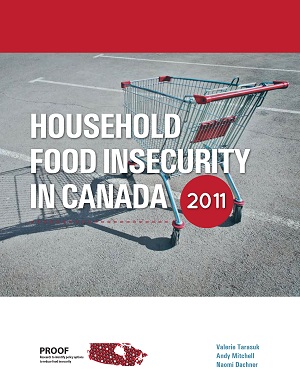Household Food Insecurity in Canada, 2011
July 25, 2013
Due to a 2015 redesign of the Canadian Community Health Survey (CCHS) that this report is based on, Statistics Canada cautions users against comparing estimates from CCHS from 2015 onwards to those prior to 2015.
UPDATED MAY 12, 2017: We have recently learned that Ontario, Newfoundland and Labrador, and Yukon opted out of food insecurity measurement in 2015 and 2016. The reports have been updated to reflect this development.
How to cite: Tarasuk, V, Mitchell, A, Dachner, N. (2013). Household food insecurity in Canada, 2011.Toronto: Research to identify policy options to reduce food insecurity (PROOF).Retrieved from https://proof.utoronto.ca/
Statement from Valerie Tarasuk, PROOF Principal Investigator:
Almost 3.9 million Canadians experienced some level of food insecurity in 2011. This marks an increase of over 450,000 people since 2008. It includes 1.1 million children living in households that have worried about running out of food, made compromises in the quality of their diets, ate less than they felt they should, and possibly gone without eating, all because they did not have the money to buy more food. The seriousness of this situation, its impact on individuals, families, communities, on our health care system and economy over all, cannot be overstated. The problem is not under control and more effective responses are urgently needed from all levels of government.
The release of this report marks a first for PROOF, a Canadian Institute of Health Research (CIHR) funded research program launched in 2011 to identify effective policy interventions to address household food insecurity. Public awareness of the extent and impact of household food insecurity is low. While there is substantial information from the Canadian Community Household Survey and other national sources, the information that is most widely publicized is based on food bank use, which cannot alone define the nature and extent of the problem. This report is one part of our mandate to bring new levels of information and analysis into the public domain and new tools for effective action on this major Canadian public policy issue.
Understanding the personal and societal costs associated with this problem will, we hope, help to build the business case for more effective, targeted interventions to prevent food insecurity and inform the development of smart, responsible, cost-effective public policy. The cost of inaction is simply too high.
Comments on the report:
Gary Bloch, MD, Chair of the Ontario College of Family Physicians’ Committee on Poverty and Health and founding member of the advocacy group Health Providers Against Poverty
“The PROOF report on food insecurity in Canada represents a major step forward in tracking the true impact of poverty in Canada. This powerful piece of research should push us to treat food security as a national “vital sign”.
It is hard to imagine how we can have a healthy and happy populace without everyone having access to adequate good, healthy food. And a lack of food security points to the deeper social ills we struggle to contain. So I applaud the authors, who have produced a report that makes this powerful issue tangible, and pushes us to move forward to the creation of an inclusive, equal, compassionate and healthy Canada.”
Stephen Gaetz, Associate Dean, Research and Professional Development, Faculty of Education
Director, Homeless Hub (Canadian Homelessness Research Network)
“In addressing issues of poverty in Canada, we necessarily need to draw on the best research to inform policy and practice. The annual PROOF report is an important example of this, and is a major resource to support the development of public policy that addresses household food insecurity.
In our recent report “The State of Homelessness in Canada 2013″ we drew on this important research to highlight the connection between poverty, inadequate benefits, high housing costs and food insecurity.
When people cannot get enough to eat because they don’t have the resources, not does physical health decline, but so does mental health and well being, and people’s ability to engage with others, participate in work or recreation, and more generally function in a healthy way. The current solutions to food insecurity are not adequate, and hunger must be part of any conversation about poverty, homelessness, affordable housing, and the solutions to these problems.”
Peter Kapler, CMA, Executive Director, Meal Exchange
“Household food insecurity is a complex and multifaceted problem. As the first comprehensive on the subject using Canadian data, this report shines a much needed light on the issue and provides facts to fuel policy and advocacy work in this field.
It is a landmark study which will serve as a brisk wake-up call to anyone not intimately familiar with the daily struggles of Canadians working to feed themselves and their families.”


